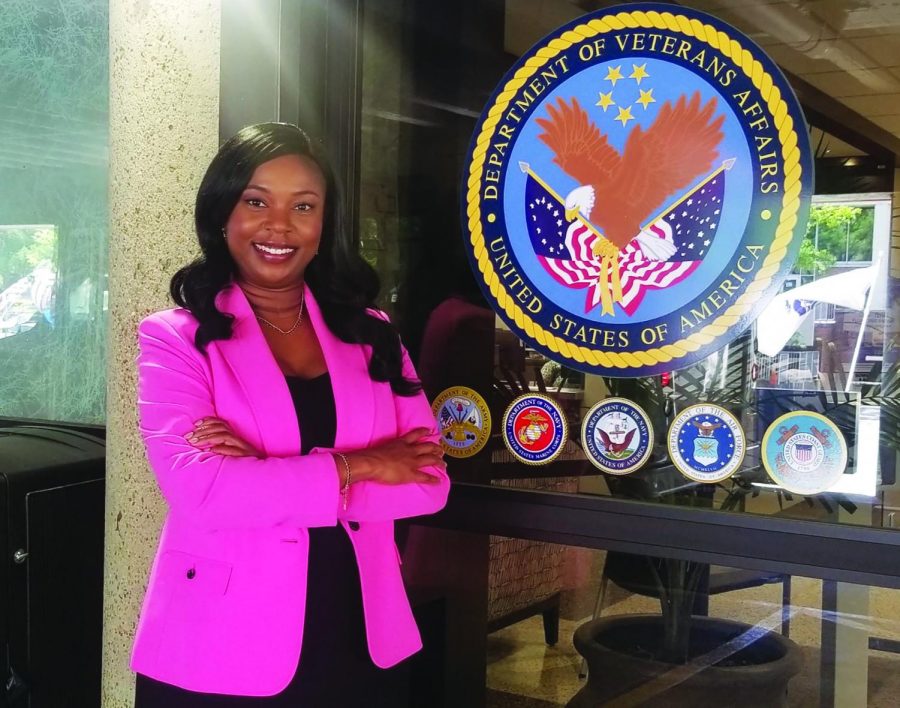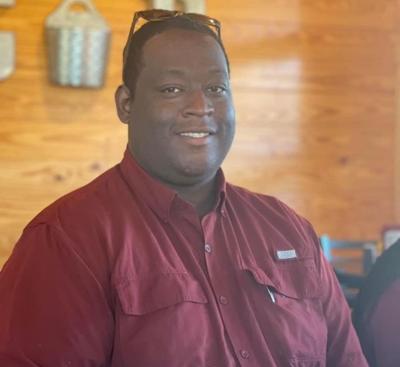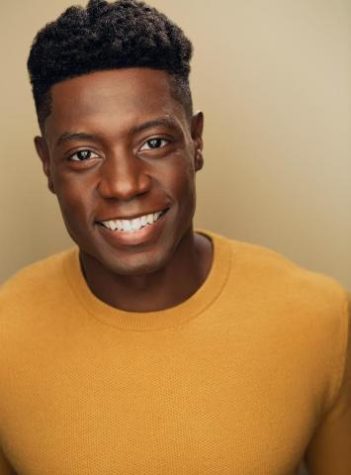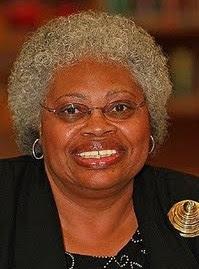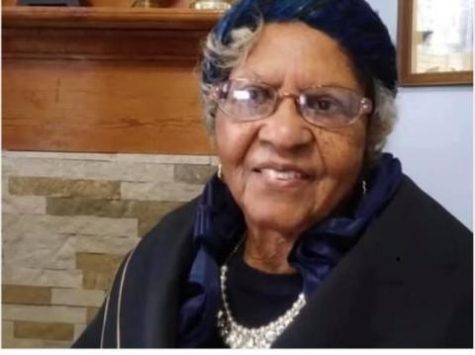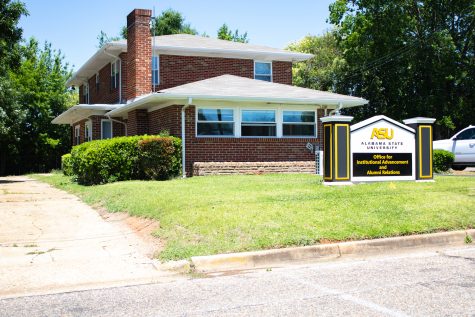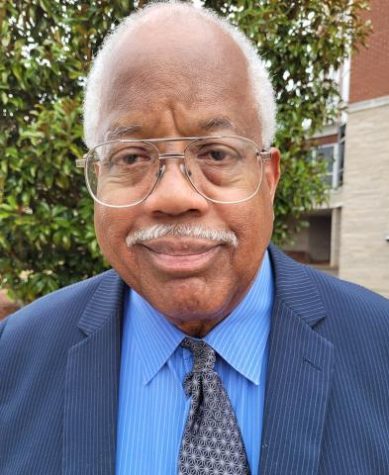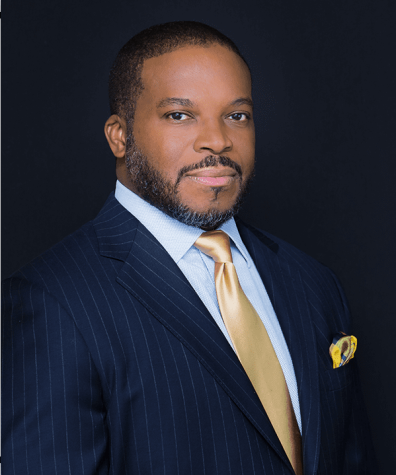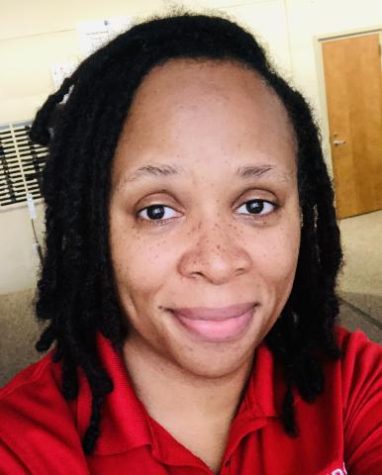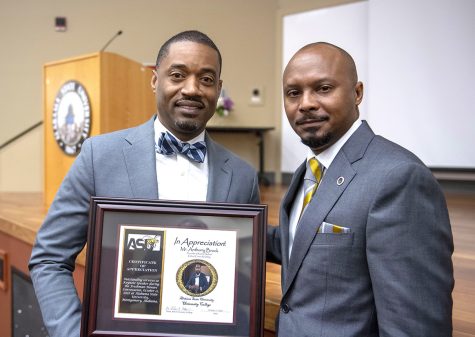Tabb leaves a lasting impact on the veterans of Alabama
Alabama State University alumna Kroshona Tabb, Ph.D., who works as the health systems specialist and executive assistant to the chief of staff at the Birmingham, Alabama location of the U. S. Department of Veterans Affairs (VA). As a student, Tabb served as a staff reporter for The Hornet Tribune and was eventually promoted to the managing editor of the editorial operations.
May 2, 2021
Few people know of all the positions that work together to make hospitals run efficiently and effectively.
With doctors and nurses at the front line, having the most direct interaction with patients, we sometimes fail to acknowledge the representatives and administrators working behind the scenes.
With much focus being placed on the patients, one often does not consider who is responsible for taking care of the caretakers, the individuals working to improve the working conditions and lives of the physicians.
One of these individuals being Alabama State University alumna Kroshona Tabb, Ph.D., who works as the health systems specialist and executive assistant to the chief of staff at the Birmingham, Alabama location of the U. S. Department of Veterans Affairs (VA).
Knowing that her work benefits the physicians of the hospital, which ultimately benefits the patients, Tabb tackles each day with passion and resilience.
“Do what you are passionate about because even on the bad days I can say that I am here for something bigger,” Tabb said.
As the oldest daughter of Army veteran Joseph Tabb, she grew up in several different cities. While she often traveled, she spent the majority of her childhood in Montgomery and Birmingham, Alabama. She says, “I am from Alabama but I do not claim any specific place.”
Because her mother, Vender Tabb, was an advocate for education, Tabb remembers spending much of her childhood reading, rather than watching television, for entertainment.
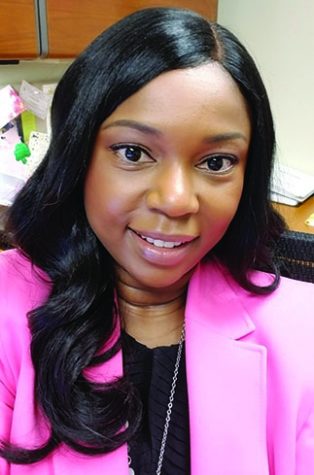
“My mom was very strict when it came to watching television,” she remembers. “She would allow only about 30 minutes of TV during the school week so my sister and I would have to choose between ‘The Cosby Show’ or ‘A Different World’ because we could not watch both!”
Tabb also considers herself to have been an inquisitive child as she enjoyed exploring insects and animals in nature.
While she attended Baldwin Junior High School in Montgomery, Alabama initially, she finished her high school career at Leilehua High School in Wahiawa, Hawaii. At Leilehua High, Tabb made a name for herself by actively participating in many student clubs and organizations. She served as the president of the French and Spanish clubs, the editor for the school newspaper, a member of the National Honor Society, the class secretary, was affiliated with 4-H, and was voted the senior homecoming queen.
As Tabb neared the end of her high school years, her college decision was a simple one as she continued a family tradition.
“My mother went to Alabama State,” she said. “I went to Alabama State. I have two uncles who graduated from Alabama State. I have several cousins who went to Alabama State, and my younger sister too!”
Not only encouraged by the family legacy but Tabb was also offered a scholarship through the Minority Access Research Career (MARC) Program that would allow a jump-start into her career as only a freshman. She says, “It paid for my tuition, books, and allowed me to work in the research labs.” In 1998 she graduated from Leilehua High School and joined the Hornet family.
Though she truly hoped to pursue a career in theatre, her family encouraged a more secure occupation.
“So my second choice, of course, was to become a physician,” Tabb said. Then possessing dreams of being in the medical field, she decided to major in biology with a minor in chemistry.
This course of study is what led her to the most influential instructor of her collegiate career. During the first semester of her freshman year, she was enrolled in a biology course taught by Karyn Scissum Gunn, Ph.D.
“I was blown away,” Tabb said. “She was beautiful, articulate, elegant, and caring. She just exudes everything that I wanted to be.”
From working alongside Gunn in the classroom and the research lab with the MARC program, the two established a lasting relationship that would influence Tabb’s eventual career and sorority choices.
“I just never saw another African American woman with that type of prestige and able to articulate, teach, and be so passionate about what she was doing,” Tabb said.
As a student, Tabb served as a staff reporter for The Hornet Tribune and was eventually promoted to the managing editor of the editorial operations.
The memories made on the newspaper staff would become some of her favorites as it led her to collaborate and fellowship with other like-minded individuals of her hue.
“Me coming from Hawaii, and being homesick, the work with The Tribune really allowed me to come back to my roots,” she shares.
She fondly remembers the conversations held and memories made while traveling with the staff to various major events.
“It was fun, we had some great times going to the gulf coast classic, magic city classic, or even just hanging out in the newsroom,” she remembers.
Outside of her work with The Hornet Tribune, Tabb pledged Alpha Kappa Alpha Sorority, Inc. in 2001. She says “It was fun just being a part of something great, planning community service events, and just getting out there and people already knowing who you are. It was a whole new experience once I pledged.”
Tabb also took part in several off-campus internships. During the summer of 2000, she worked in a research lab at Penn State University in Centre County, Pennsylvania where she studied brain receptors in rats.
“I was getting exposure so that I could strengthen my research skillset,” she said.
During the summer of 2001, Tabb received an internship at John Hopkins University in Baltimore, Massachusetts where she worked in the pulmonary lab studying cells for the school of public health. It was during this internship that she realized that the life of a physician was not for her. While performing rounds with the chief of the pulmonary department, she witnessed their treatment of a patient who had overdosed on heroin.
“That is when I realized being a physician was not something that I was comfortable with, it would not suit my personality.” After much consideration, she decided to pursue a research career in neuroscience instead, where she would study epilepsy and other neurodegenerative diseases.
After finishing her undergraduate studies in 2002, Tabb enrolled in the largest class of neuroscience graduate students that Emory University of Atlanta, Georgia has ever seen.
“I felt like I had accomplished something just by getting in because I came from little ole ASU to Emory which is a top-ranked private institution with a top-ranked neuroscience program,” she said.
While in graduate school, she shadowed her mentor, David Weinshenker Ph.D., who was then a new professor looking for ready and capable students.
“I knew that it was meant for me to be there because he needed me to graduate and there were some days that I did not want to finish, but he was always there pushing me forward.”
While at Emory, she spent many hours of her day in the research lab studying the behaviors and brain activity of rats. The research paired with the classwork proved to be a major feat as Tabb often struggled to develop strong study habits.
“My classwork was really tough. It was a lot of information in a short time so I struggled but with the support from my mentor, resilience, and faith in God, I made it through.”
She eventually found a career in research to be unappealing as she hoped to have a more immediate impact on patients with her work.
“Although I really loved learning about epilepsy and learning about neurodivergent diseases, I got to the point where I did not want to be in a lab by myself wearing a white coat and working with animals all day.”
Upon submitting her dissertation in 2008, and being granted her doctorate in neuroscience in 2009, Tabb continued working as a clinical coordinator, a job that she worked part-time during her final year of graduate school.
“It was still research, but it was a different kind of research since I was working with people,” she expresses.
Then responsible for organizing and placing individuals in pharmaceutical trials, she was able to have a more direct impact through her work.
She soon hoped to progress in her career as she applied for a similar position within the Emory University Hospital. Though that position was filled, the hiring agent offered a position working in sales as a clinical coordinator at the VA located in Atlanta, Georgia.
“It was great!” Tabb said enthusiastically. “It was continuing what I wanted to do in clinical coordination and program management. It allowed me to talk to veterans and I fell in love with the mission. It also allowed me to do some research at the same time.”
After working in that position for a year, Tabb began looking for positions within the VA system in Alabama as she hoped to return home soon. In 2009, she took on the role of the Health Science Specialist at the VA in Birmingham, Alabama where she held the same responsibilities that she did with the Emory University Hospital.
“That was October 2009 when I got that job and I am still here enjoying every bit of what we do here, which is helping our veterans, providing additional resources, and supporting them,” she said.
Since then, she has been promoted to program specialist, and to her current position as the health systems specialist and executive assistant to the chief of staff.
“Every day is different,” Tabb said when describing the responsibilities in her current position. As the lieutenant to the Chief of Staff, Oladipo A Kukoyi Ph.D., Tabb serves as the front line that any issue must go through before reaching Kukoyi.
In her position, she schedules meetings, manages the calendar, drafts his presentations, reviews documents, plans events, manages budgets, oversees disciplinary and hiring actions, checks references, and so much more.
While referring to all assistants to the hospital’s executive board she comments, “We are the right-hand man … They use us to vent, they use us to plan, they come to us for guidance, they use us to keep them sane, and to organize.”
Every day Tabb works hand-in-hand with Kukoyi to improve the working experience of each employee of the VA hospital.
Utilizing her research expertise, while also honing her strategic planning and multitasking skills, Tabb has found herself in a position that allows her to use her best assets in an administrative role. She mentions, “This is a job that allows you to learn what is necessary to become one of those executive leadership team members and all the responsibilities that come with it… I am the only executive assistant with a Ph.D. It is a little different but I think I bring value to the organization because I do have that background.”
Along with her work as the executive assistant, she also directs the Whole Health Program which allows patients to take control of their treatment.
“Instead of asking, ‘What is the matter?’, we ask, ‘What matters to YOU most?’ From that, we can plan what they really need to do as opposed to just giving medication without really thinking about what is important to the veterans,” Tabb explains.
With this initiative, she emphasizes the power of self-care and wellness through the use of holistic approaches to treatment such as yoga and meditation.
Through her work, Tabb considers the most challenging aspect to be the tendency to become overwhelmed. Worsened by the pandemic, the hospital often faces conflicts dealing with government policies and protocols. While it can be a hassle to overcome, Tabb is motivated by the thought of ultimately helping the veterans, especially considering her father is a veteran.
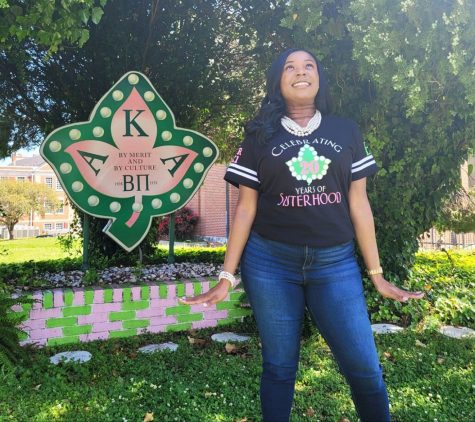
“Just having that connection helps me deal with the bad days,” she said.
This impact left on the veterans is what Tabb considers to be the most rewarding aspect of her work.
“I can see the impact when I do the clinical programs because more veterans are getting a certain type of care, more veterans are saying, ‘Hey, this is really helping me.’ I can see that impact in real time as opposed to years and years of doing experiments on lab rats,” Tabb said.
Crediting her success to her resilience, Tabb is proud of her drive to get back up when she is knocked down.
“I do not think I would have been close to anywhere without being able to say, ‘Yes, I failed at this,’ or ‘Yes, I failed at this but I got back up and continued to move forward.’” This resilience not only allowed her to keep progressing through her doctorate years but also as she overcomes each obstacle thrown at her every day as the executive assistant.
She also credits her humility, as she does not let her rank or her title keep her from performing the “frowned upon” tasks.
“I am just Kroshona,” she simply states. “I am going to be Kroshona whether it is with leadership or frontline staff … At the end of the day, I am here for a bigger purpose, not the title, but for the team and the veterans,” Tabb says.
Thankful for her time spent as a Hornet, Tabb believes that ASU provided a foundation and character that followed her throughout the years.
“I know I have a family back at State that is supporting me and cares if I make it or not,” she says. Still holding on to the relationships created while a student, she knows that she can always find love and guidance from her fellow Hornets.
“If I get too frustrated, I can always reach back and ask, chat or vent with them,” she said. “It is like a family.”
Currently, Tabb enjoys life as a bachelorette in Birmingham. Though she has no immediate family, she is extremely grateful for the ones in her life.
“I have a family,” she said. “It may not be the traditional family with a husband and children, but I have a family who supports me. We vacation and do other things, and that is fine for me until my time comes. And if it does not come I am content.”
In her free time, Tabb enjoys finding new ways to promote self-care, wellness, and fitness in her own life. She is also an avid traveler and takes an international trip every two years. Having already been to London, Trinidad Tobago, Germany, and Prague, she hopes to visit her sister, Jolonda Tabb-Muhammed, who currently resides in Bangkok, Thailand next.
She also has begun mentoring the next generation of doctorate students, some of them being ASU graduates themselves. Tabb says,
“That makes what I have been through worth it,” she said. “I get to share my knowledge and experiences with folks coming up, and they get to see me as someone they can relate to.” To these students, she passes on wisdom, advice, and knowledge that she has accumulated over her 20 years working in medical care and research.
To the current students hoping to get into health care, she advises to begin researching, interning, and shadowing doctors as early as possible. She believes this is the only way to get a true taste of the career field and could save students a lot of valuable time.
“Do your research,” she said. “There are plenty of engines out there that you can search through. I did not have YouTube when I was in school but now you can see the life of a doctor.”
To the entire student population of Alabama State University, Tabb urges them to simply, “Keep going.”
She believes the stress that college brings is a series of trial and error, but it is through that error when one builds their character and drive. “Build that resilience. You can do anything, but if you stop early you will never know.”


